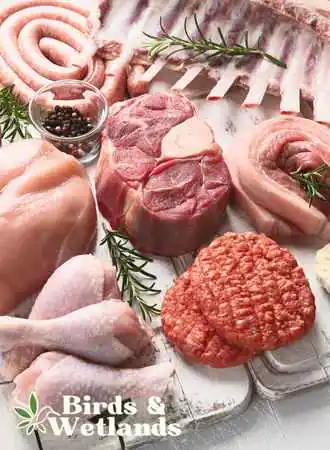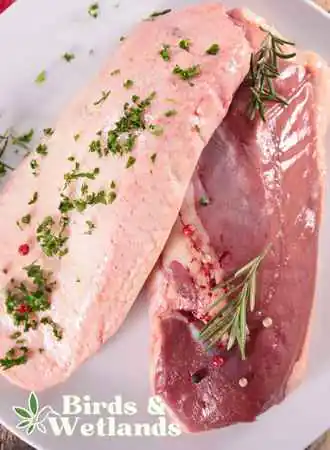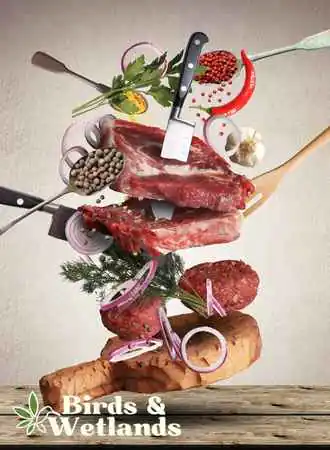Swans have long been revered as symbols of grace and beauty in literature, art, and mythology. But beyond their cultural significance, many people may wonder if these birds can also be consumed as a food source.
We eat chickens, ducks and geese, but not many people eat swans. Swans are edible, but they are not common foods. Moreover, the question of whether or not swans can be eaten raises interesting ethical and culinary considerations.
In this post, we will delve into the history of swan consumption, examine the current laws and regulations surrounding the hunting and eating of swans, and explore the taste of swan meat.

Key Takeaways on Eating Swans
- The swan is not categorized as a food animal, and swan meat is not particularly common.
- People who have eaten swan described it as lightly gamey and has a slightly fishy taste.
- Outside of the UK and UK, the swan is served in restaurants.
History of Swan Meat Consumption
The history of swan consumption can be traced back to ancient civilizations, where swans were considered a delicacy and symbol of wealth and nobility.
In ancient Egypt, swans were depicted in art and hieroglyphics and were likely consumed by the elite. The ancient Greeks also had a fondness for swan meat and considered it a delicacy. The bird was so highly prized that it was said to be served at the banquets of Zeus.
The Roman naturalist Pliny the Elder wrote that swans were “delicious eating” and were often served as a dish at banquets.
In 1482, King Edward IV of the House of York passed The Act of Swans, which declared all the swans belong to the royal family and all other landowners and nobility.
Medieval European nobility had a particular fondness for swans. It was considered a delicacy and a symbol of wealth and power. Roast swan was served at royal banquets and grand feasts, and the possession of swans was a sign of nobility.
The bird was also a part of religious ceremonies, such as the swan upping ceremony, which was held on the Thames River in England.
During the Renaissance, swan consumption was associated with wealth and nobility. In fact, it was a crime for commoners to hunt or eat swans in many European countries. The penalty for poaching a swan could be severe, including imprisonment or execution.
During the Elizabethan era, the baked swan was a particularly popular dish on dinner tables. People scalded the bird and took the bones out from the meat. It was then seasoned with salt, ginger and pepper. It was larded and then put in a deep coffin of rye paste. Once it was baked, the vent hole was filled with melted butter.
In the 17th and 18th centuries, the swan fell out as a favored dish for Christmas dinner. This was partly due to the growth of the middle class, who could not afford such expensive delicacies. And partly due to the growing sentiment that swans should be protected and preserved rather than hunted and eaten.
In the United States, swan meat was commonly consumed in the 19th century, when European settlers began hunting birds for food.
However, by the early 20th century, swan hunting had been greatly reduced, and the bird population had become depleted. The Migratory Bird Treaty Act of 1918, and the subsequent listing of swans as a protected species, made it illegal to hunt or sell swan meat in the United States.
Today, swan consumption is extremely rare and is generally considered taboo. In many countries, the bird is protected by law, and hunting or selling swan meat is illegal. The UK’s Countryside Act has made it illegal to kill, keep and eat swans.
There are also ethical considerations surrounding the consumption of swans, as they are highly intelligent and social animals.
However, in a few places like China, it’s legal and occasionally considered a delicacy and prepared as a traditional dish.
While it is still technically permissible for members of the royal family in Great Britain and the fellows of St. John’s College at Cambridge to eat swan, there is currently no evidence to suggest that they continue to do so. Nevertheless, people in the UK don’t eat swans because the Queen owns them.
It is not accurate to say that the Queen of England owns all swans in Britain. The tradition of “Swan Upping” is held every July, during which a census is taken of all the mute swans on the River Thames, which are marked by the Royal Swan Master for ownership.
All unmarked swans are claimed as the property of the Crown, while swans marked with the Vintners’ or Dyers’ Company are considered to be owned by those companies.
In recent years, some efforts have been made to reintroduce swan meat as a sustainable food source. But it remains very uncommon to find it in modern cuisine.

What does swan meat taste like?
Swan meat is said to have a strong, gamey flavor similar to goose or duck. Swan meat is lean and deep red and has a slightly coarser texture than other poultry meats, making the swan harder to cook than fish or chicken.
Despite looking like a cross between a Canada goose and a snow goose when all the feathers are plucked, people who have tasted swan said they’re absolutely delicious. The taste of the meat can be quite strong, so it is often paired with strong, rich sauces or spices to help balance it out.
It is generally considered a delicacy in other countries but is not commonly consumed due to legal and conservation concerns.

Why don’t people eat swans?
There are various reasons why people don’t eat swans, even though they were once considered a delicacy in certain parts of the world.
One of the primary reasons is that swans are considered a protected species in many countries. For example, in the United Kingdom, killing or capturing wild swans is illegal, as the Crown owns them. Similarly, the trumpeter and tundra swans in the United States are protected under the Migratory Bird Treaty Act (MBTA).
Another reason people don’t eat swans is that they are considered a symbol of grace and beauty, and many people find eating such a majestic bird to be distasteful.
Swans are also known to form strong pair bonds, and many people think eating a bird that forms such close relationships is morally repugnant.
There are very few places where you can find swan meat for sale, as it is not a common food item. Even in countries where it is legal to hunt swans, the meat is not readily available in supermarkets or restaurants.
Swans are beloved animals, so not many people want to eat them. These birds appear in Swan Lake, and the mute swan is Denmark’s national bird.
Is eating swans a good way to control their population?
Mute swans are not native birds in the United States, but their population has recently increased. However, attempts to control or reduce their population have been implemented in areas where they are considered invasive species.
Mute swans have gained a reputation for causing disruptions to the ecosystems and habitats of other wild birds. They are also known for their aggressive behavior towards humans. Their impact on their natural habitat is similar to that of the Canada geese.
Eating swan meat is not typically considered a viable measure to control and manage the mute swan population in the United States.
Culling and hunting swans have been used in some areas as a population control measure, but this approach is controversial and only sometimes effective. Also, many hunters are reluctant to hunt swan, instead opting to hunt other animals.
While mute swans are not protected under the Migratory Bird Treaty Act, it is illegal to harm adult swans, cygnets and eggs in many states. For instance, mute swans are protected by the New York State Environmental Conservation Law in the state of New York.
Rather than hunting and eating swans, effective and humane methods to control the population include habitat modification, egg addling, relocation, and contraception.


